Will this Quebec election finally take the rest of Canada by surprise (and/or if it does will anyone care)?
Aug 1st, 2012 | By Randall White | Category: In BriefThere seems at least some anglo central Canadian consensus that, as Lawrence Martin urges in today’s Globe and Mail, in the Quebec election that Prime Minister (Premier?) Jean Charest has just officially called for September 4, 2012, “The Péquistes don’t scare Canada now.”
The latest survey data does show that “Parti Québécois takes the lead ahead of election: poll” and “Pauline Marois’ Parti Quebecois leads Jean Charest’s Liberals.” But the lead is far from gigantic. (According to Léger Marketing: PQ 33%, Liberals 31%, and the new Coalition Avenir Québec [CAQ] 21%.) And according to Antonia Maioni, “associate professor of political science at McGill University” in the heart of Montreal, “Quebec’s election is too close to call.”
Tim Harper at the Toronto Star has argued that “PQ victory in Quebec election will blow up Ottawa’s status quo.” And that does seem probably true enough. Yet, others will say, so what?
As Lawrence Martin himself has urged: “Previous federal governments had large numbers of seats in Quebec. They had to be sensitive to the province’s nationalist causes. Stephen Harper’s Conservatives have only five. They have won – and can win –Â without Quebec. They don’t have to kowtow. While some see a PQ victory as causing all kinds of headaches for the Prime Minister, he might actually find political benefit. Canadians would likely rally behind a hard line toward a PQ-governed Quebec. Mr. Harper’s concern is the next federal election. That will come before another referendum – if there ever is another referendum.”
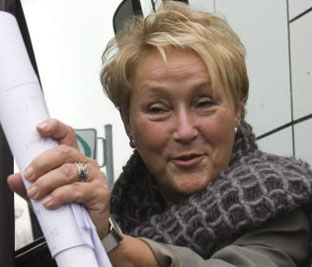
La chef du Parti québécois Pauline Marois : she’s no René Lévesque ... no Lucien Bouchard, but can she win on September 4 anyway?
Out in Mr. Harper’s own Western Canadian heartland, I can today find only two rather obscure references to the calling of the Quebec election on the Vancouver Sun website (“Quebec election set for Sept. 4; Charest seeks record-tying fourth straight term” ; “Some key issues in the Quebec election campaign”), and none at all on the homepage of the Edmonton Journal site.
History does show that the people of Quebec have a remarkable capacity to surprise the rest of us – and to spark key twists and turns in the wider story of Canada, from coast to coast to coast (and in both official languages, including aboriginal rights, multiculturalism, etc, etc, etc). And who knows? Maybe they will somehow do it again, on September 4, 2012.
* * * *
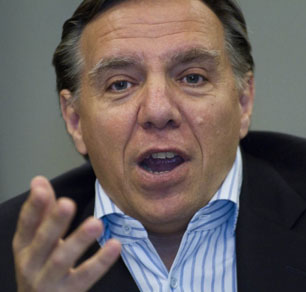
François Legault, leader of the “new and unpredictable Coalition Avenir Québec (CAQ) ... a mix of former sovereigntists, right-wing Action démocratique du Québec relics and opportunists from across the political spectrum.” Can he prove a spolier, and for whom?
Yet something about what Lawrence Martin says does seem essentially correct. In my own case, I have lived next door to Quebec virtually all my life (if Toronto can be described this way – which I think it can, especially in the old Grand Trunk Railway part of the city where I live). I have francophone Quebec in-laws, so to speak, some of whom now live in California (also the homeland of the wife of Lucien Bouchard). I still get emails as a “McGill parent” (where this institution has long ago ceased to be the bastion of the Montreal anglo plutocracy that it no doubt was in days gone by). I am now in my late 60s, and I have been hearing incessantly that Quebec is about to leave Canada since my late teens. I have concluded that if this ever was really going to happen, it would have happened already.
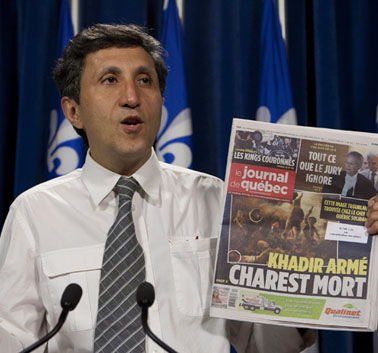
Finally, Ms Maioni explains that “this time round, things are made even more complicated for the PQ by the fact that it may be outflanked on the left by Québec solidaire, led by Amir Khadir, who put the full weight of his party’s support behind the student protests last spring.”
I have concluded as well that Canada without Quebec is just practically impossible – and vice versa. I believe too that I have some good enough reasons to hope growing numbers of voters in both the rest of Canada and Quebec itself are coming to a similar conclusion. (And I suppose, in the very end, if this is not true, I will probably be dead before the people of both Canada and Quebec actually do indulge in some final crazed moment of insane self-destruction.)
So … I am looking forward to the September 4 Quebec election. And I am hoping that the campaign between now and then, viewed from a seat in the balcony next door, will enliven what a recent edition of the London Review of Books has called this “Sad Summer” in the global village. (Or so the “Sad Summer Issue” seemed to mean to me : And all this reminds me, btw, that Jacques Parizeau had a PhD from the London School of Economics, and apparently sent his children to private schools in England! History as the American-born T.S. Eliot said, also from London, England, “has many cunning passages.”)
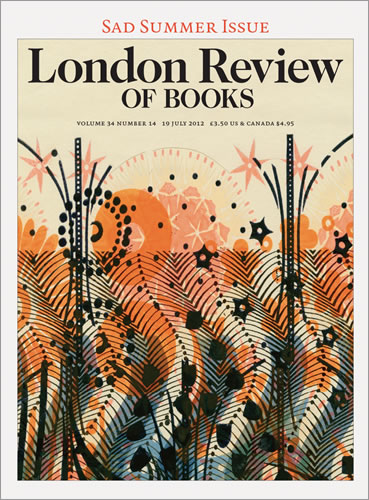 Meanwhile, I think it is interesting that Lawrence Martin has written, in the midst of his “The Péquistes don’t scare Canada now” column: “Pauline Marois …is no René Lévesque … no Lucien Bouchard … The Bloc Québécois, the support team her separatists have had in Ottawa, is nowhere near the force it has been. The most popular politician in Quebec is probably Thomas Mulcair, a [federal] New Democrat.”
Meanwhile, I think it is interesting that Lawrence Martin has written, in the midst of his “The Péquistes don’t scare Canada now” column: “Pauline Marois …is no René Lévesque … no Lucien Bouchard … The Bloc Québécois, the support team her separatists have had in Ottawa, is nowhere near the force it has been. The most popular politician in Quebec is probably Thomas Mulcair, a [federal] New Democrat.”
It may be almost equally interesting that a Canadian Press article in yesterday’s Vancouver Sun was headlined “Justin Trudeau among few federal politicians weighing into Quebec election.” The young M. Trudeau represents the Montreal federal riding of Papineau, but his mother is from BC, and he taught school for a time in Vancouver himself.)
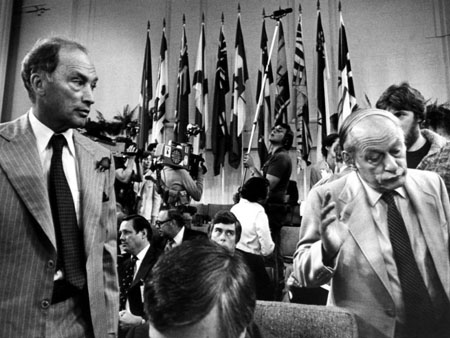
Pierre Elliott Trudeau et René Lévesque au deuxième jour de la conférence constitutionnelle, le 9 septembre 1980. PHOTO: ARCHIVES LA PRESSE CANADIENNE. Both sadly no longer with us now, but in the long run they may both win, along with both Canada and Quebec.
My own current view about the real-world future of Quebec is that it will finally prove to be a characteristically Canadian / Canadien compromise between what were once thought to be the conflicting visions of Pierre Trudeau and René Lévesque. And even Stephen Harper will be able to take some credit for helping point us in this direction, with his late November 2006 Canadian House of Commons resolution, about how the Quebecois are a nation within a united Canada – whatever we may ultimately all agree (more or less) that means in the often rather strange universe of Canadian practical politics, from coast to coast to coast.
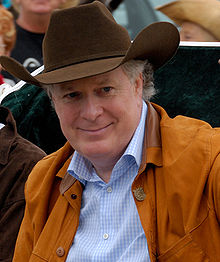


If Quebec ever left Canada it would be a disaster, for everyone including Quebec. Once one province sets the precedent, it’s only a matter of time before places like Alberta or Ontario decide they would be better off without sending money off to other parts of the country and go the same way.